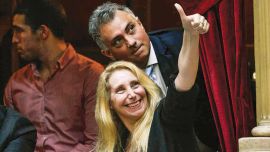Economy Minister Sergio Massa presented Argentina’s 2023 Budget in Congress on Wednesday afternoon, defending it as "prudent and realistic" while assuring that it complied with the objectives set by lawmakers when approving the agreement with the International Monetary Fund.
Accompanied by the secretaries of his Ministry, Massa explained the main lines of the initiative to the Budget and Finance Committee chaired by Carlos Heller (Frente de Todos-City).
The minister admitted that he "bore the cross" of last year’s failure to approve the Budget as the Speaker at that time, highlighting the "importance" of Congress setting "a road map" this time round.
According to Massa, this new Budget “boosts tax policy while increasing primary spending in real terms."
"We have to improve people's quality of life. We must generate a process of development with social inclusion," said the head of the economy portfolio.
The bill contemplates overall spending of almost 29 trillion pesos while projecting an annual inflation of 60 percent, a two percent growth rate, a 2.9 percent increase in the investment rate, a fiscal deficit of 1.9 percent of gross domestic product and an exchange rate of 218.90 pesos per dollar by the end of next year – a 62 percent increase on the current official exchange rate.
Meanwhile Massa pointed to an estimated export growth of 7.1 percent, driven by the knowledge economy, mining and agriculture.
He also indicated that he expected to reduce the tax burden by 0.18 percent from 23.95 percent of GDP this year to 23.77 percent next.
"If we in Congress fix clear rules, fiscal stability, the availability of hard currency and mechanisms for adding value to our economy, this will somehow permit us to become major players in the next 10 years in the global markets of proteins, mining, energy and the knowledge economy," he said.
The Economy supremo highlighted that one of the government’s aims in this Budget is "to work towards the recovery of income in Argentina" since "the fall in [real] wages in the last six years has been very important."
"I feel that I’m taking my last steps in political life," said the minister, expressing optimism that the Budget objectives could be met next year and seeking complicity with opposition caucus chiefs Cristian Ritondo (PRO) and Mario Negri (Radical).
Massa’s formal introduction was followed by Secretaries Gabriel Rubinstein (Economic Planning) and Raúl Rigo (Treasury) while on Thursday afternoon the Secretaries Eduardo Setti (Finance), Ignacio de Mendiguren (Industry and Productive Development), Juan José Bahillo (Agriculture) and Flavia Royon (Energy) followed suit.
Next week will be the turns of AFIP tax bureau chief Carlos Castagneto, Anses social security administration head Fernanda Raverta, Customs chief Guillermo Michel and Central Bank governor Miguel Ángel Pesce to present their respective reports, as demanded by the Juntos por el Cambio opposition.
It was also confirmed that Ministers Claudio Moroni, Gabriel Katopodis (Public Works) and Alexis Guerrera (Transport) will be presenting reports to Congress while the same is expected of Carla Vizzotti (Health), Juan Zabaleta (Social Development) and Jaime Perczyk (Education).
The governors and the opposition are gearing to negotiate public works for their provinces but in general attitudes are more positive than last year when the government was left stranded without a budget. In response, President Alberto Fernández’s government extended by decree revenue and expenditure allocations according to the norm approved for 2021.
A few days ago deputy Emilio Yacobitti (Evolución Radical-City) anticipated via Twitter that this Budget presented "more reasonable macro-economic variables" than last year, thus offering better conditions for "general approval" by Juntos por el Cambio.
It remains to be seen whether the rest of the opposition thinks the same but beyond the logical doubts in such a sensitive debate, the initiative seems to be heading towards majority support.
Lower house debate is set for October 11 to 24 with the Committee’s approval for submission to the House floor set for October 26.
– TIMES


























Comments